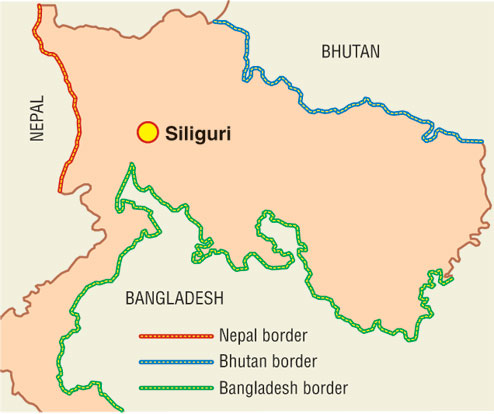
Siliguri, Nov. 7: The seizure of explosives in huge quantities from a Nepali couple in Siliguri on Saturday has brought the focus back on the vulnerability of India's chicken neck that is on the border with Bangladesh, Nepal and Bhutan.
Police had recovered 609 gelatin sticks, 200 detonators and coils of wire from a house in the Rail Gate area here on Saturday night and arrested Dawa Tshering Bhutia, alias Dawa Gurung, and his wife Puja Limbu. The explosives were stored in a room that the couple had rented.
Apart from the duo, an associate of the couple, Krishna Prasad Adhikary, also from Nepal, had been arrested.
Officials of Siliguri metropolitan police today confirmed that the explosives had been brought from Shillong and the trio were trying for potential buyers. This fact, the officials said, established the town's vulnerability in terms of criminal activities, militancy and poaching.
The Telegraph tries to assess why the Siliguri corridor, often referred to as the chicken's neck, is vulnerable in terms of security. The corridor is 100km long and the width comes down to 17km at one point.
Border proximity
The area has always been a vital geographical artery of India as it connects the Northeast with the rest of the country. The largest urban hub in north Bengal located in the corridor, Siliguri is just 40km from Nepal and 8km from Bangladesh.
The Bhutan border is around 60km away, while the China frontier is about 150km away.
The Sashastra Seema Bal guards the Nepal and Bhutan borders, while the BSF mans the Bangladesh boundary.
"One of the major problems that we face is there are no restrictions on movement of people across the India-Nepal and India-Bhutan borders. Anyone can walk in ," said a senior intelligence officer.
"Unlike Malda, where the principal concern is infiltration from across Bangladesh, Siliguri is a melting pot... the SSB acts on tip-offs and intercepts people crossing the border illegally. But generally, there is no strict checking of people in the Siliguri corridor," the intelligence officer added.
According to him, no other Indian town is as vulnerable as Siliguri in terms of people entering from neighbouring countries.
"We all know the strategic interests of China in Nepal, Bhutan and Bangladesh because the chicken's neck can be accessed from these countries... Unless the vigil is intensified in Siliguri, the problems will compound," said an intelligence officer.
Insurgent groups
Presence of the insurgent groups in the Northeast and north Bengal has often been found in and around Siliguri.
Incidents like a bomb blast on a passenger train in 2006, blamed on the KLO, had rocked Siliguri. Another blast in 2008 at a rented accommodation in Champasari, where three Nepal residents died while making IEDs, and arrests of a number of self-styled leaders of the Northeast-based militant organisations are chilling reminders of how Siliguri is being used both as a target and a haven by insurgent groups.
Also, a number of KLO militants have been arrested from the outskirts of Siliguri and adjoining Jalpaiguri.
In connection with Saturday’s haul, the investigators have been trying to find out whether the arrested trio had any accomplice in Siliguri. “It is obvious that they have local contacts. We have found a new trend. Although explosives had been seized in Siliguri earlier, this is the first time that we have found such items were brought for sale here,” said a source.
The police think the items were transported in phases. A senior officer said the seizure of over 600 pieces of gelatin sticks indicated that a major deal had been either foiled or delayed.
“Our officers are interrogating the arrested trio to know who the buyers were. Once we get the buyers’ identities, we may have an idea of their intentions,” the source said.
Absence of vigilance
In Siliguri and its outskirts, checks are conducted on a regular basis at the Bagdogra airport but there is laxity on the part of agencies responsible for carrying out checks at railway stations and bus stands, several policemen and intelligence officials this newspaper spoke to confirmed.
“Security personnel are posted at New Jalpaiguri station and Tenzing Norgay Central Bus Terminus, but regular checks are not conducted,” a resident said.
Officers of the state police and other security agencies, however, claim that they are alert.
“We are aware of the importance of the Siliguri corridor. We are vigilant to ensure that no unlawful activities take place here. Also, we regularly remain in touch with central and state agencies and exchange information,” Indra Chakraborty, the deputy commissioner of Siliguri metropolitan police, said.
Lack of awareness
Hundreds of people, moving into the town for different purposes, rent houses at different localities. Unlike hotels where the police get a chart of boarders with their identity proofs everyday, most of the people offering accommodation on rent do not bother to go to police stations and provide details of the tenants.
“We have time and again told people that they should provide us with details of their tenants. It is a small thing that they need to do at their local police stations. Still, there is lack of awareness among most residents. In many cases, including yesterday’s seizure, it has been found that tenants are involved in crimes,” a police officer said.
ADDITIONAL reporting BY BIRESWAR BANERJEE











